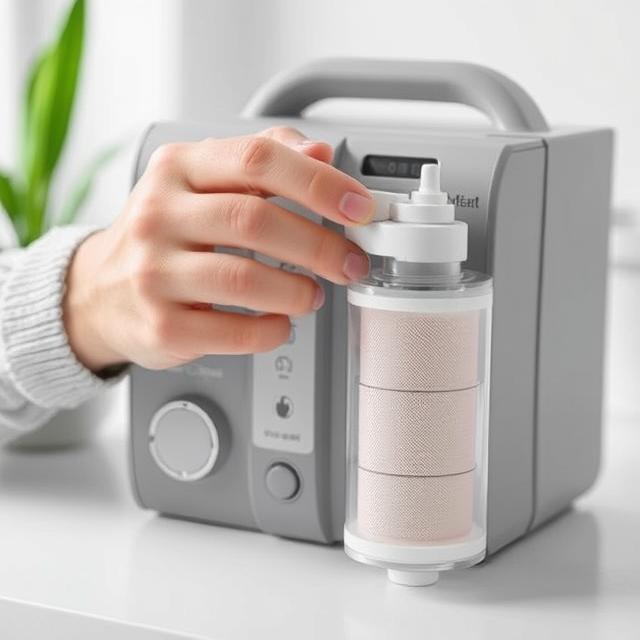-



How To Choose The Best Clean Oxygen Concentrator Filter for Your Device?
Views: 0 Author: Site Editor Publish Time: 2025-04-05 Origin: Site

Oxygen concentrators are essential medical devices for patients with respiratory disorders. They provide a continuous supply of oxygen, helping to improve the quality of life for individuals who require supplemental oxygen therapy.
While these devices are designed to be reliable and long-lasting, the filters within them are subject to wear and tear over time. In this article, we will explore the importance of clean oxygen concentrator filters, the different types available, and how to choose the best one for your device.
Understanding the importance of clean oxygen concentrator filters
Oxygen concentrators work by drawing in ambient air, filtering out nitrogen, and delivering a concentrated oxygen stream to the patient. The filters play a crucial role in this process by removing dust, allergens, and other airborne particles from the air before it enters the machine.
Clean filters ensure that the oxygen delivered to the patient is free from contaminants. Dirty or clogged filters can compromise the efficiency of the concentrator, leading to reduced oxygen output and potentially harming the patient’s health.
Regularly replacing and maintaining clean filters is essential to ensure the proper functioning of the device and the well-being of the patient.
Types of oxygen concentrator filters
There are several types of filters used in oxygen concentrators, each serving a specific purpose in the filtration process. Understanding these types can help you choose the right filter for your device.
Pre-filters
Pre-filters are the first line of defense in the filtration system. They capture larger particles such as dust, pollen, and pet dander before the air enters the main filtration unit. Pre-filters are typically made of foam or mesh materials and are washable and reusable.
HEPA filters
High-efficiency particulate air (HEPA) filters are designed to capture smaller particles, including bacteria and mold spores. These filters are highly efficient and are often used in conjunction with pre-filters to provide a comprehensive filtration system.
Activated carbon filters
Activated carbon filters are used to remove odors and volatile organic compounds (VOCs) from the air. These filters are particularly useful in environments where the air may contain unpleasant smells or harmful gases.
Ultraviolet (UV) filters
UV filters use ultraviolet light to kill bacteria and viruses present in the air. These filters are often used in combination with other types of filters to provide an additional layer of protection.
Choosing the best clean oxygen concentrator filter
When selecting the best clean oxygen concentrator filter for your device, several factors should be taken into consideration:
Compatibility
Ensure that the filter you choose is compatible with your oxygen concentrator model. Different models may have specific filter requirements, and using an incompatible filter can damage the device or void the warranty.
Filter type
Consider the type of filter that best suits your needs. If you live in an area with high levels of dust or allergens, a pre-filter may be sufficient. However, if you require a higher level of filtration, such as for medical purposes, you may need a combination of HEPA and activated carbon filters.
Ease of maintenance
Choose a filter that is easy to clean and maintain. Some filters are washable and reusable, while others need to be replaced periodically. Consider your lifestyle and how often you are willing to perform maintenance tasks.
Quality and durability
Invest in high-quality filters that are durable and long-lasting. Cheap filters may save you money upfront, but they may need to be replaced more frequently and may not provide the same level of filtration as premium filters.
Brand reputation
Choose filters from reputable brands with a track record of producing reliable and effective products. Read reviews and seek recommendations from healthcare professionals to ensure that you are purchasing a trusted product.
Cost-effectiveness
Consider the cost-effectiveness of the filter. While premium filters may have a higher upfront cost, they may provide better performance and longer lifespan, resulting in cost savings in the long run.
Conclusion
Clean oxygen concentrator filters are essential for the proper functioning of these medical devices and the well-being of patients who rely on them for supplemental oxygen therapy.
By choosing the right filter type, ensuring compatibility, and considering factors such as ease of maintenance, quality, and cost-effectiveness, you can ensure that your oxygen concentrator operates efficiently and provides the best possible care for patients with respiratory disorders.
Related Products
content is empty!
Related News
content is empty!
CONTACT US
NO.176, Gaoxin 5th Road, High-tech Industrial Park, Rizhao City276800, Shandong Province, China +86-13396234532 +86-13396234532Copyright © 2023 ZhenFu Group All Rights Reserved. Technology By leadong.com | Sitemap | Privacy Policy














